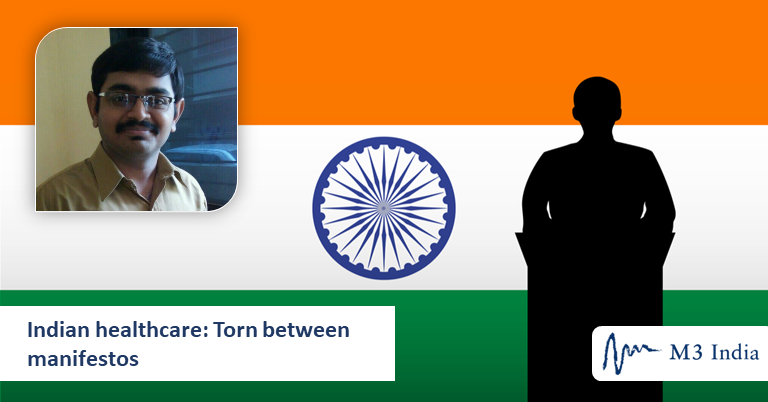Elections 2019: 'Indian healthcare- torn between mainfestos'- Dr. Soham D Bhaduri
M3 India Newsdesk Apr 11, 2019
Summary
Dr. Soham D Bhaduri opines on the recently released manifestos from contesting parties ahead of the much awaited and talked about Indian General Election 2019.
- One introduces only minor additions to their current insurance model of healthcare
- The other makes major promises of a 'Right to Healthcare Act'

The 2019 general elections are upon us, and both the major parties have released their respective manifestos. It makes a case to examine how healthcare fares in either of them.
The current ruling party seems poised to carry on with its money mainly on the insurance model of healthcare delivery
Its manifesto contains only a few minor additions (like strengthening telemedicine services) to the model already in place, and much of it only reiterates the promises already made and the milestones already achieved.
Further, it steers clear of making any major promises. While it talks about ‘Health for All’, there is little in the way of a roadmap of a universal system of healthcare delivery that cares for more than just the poor populace. No health spending commitments are made in the manifesto, and there is only weak mention of strengthening the public curative healthcare infrastructure. It also skips the important issue of effective regulation of private healthcare, while streamlining and strengthening of AYUSH systems finds no mention.
In the walk up to the 2019 polls, the current government’s flagship health program, namely the Ayushman Bharat mission, has already come under intense attack of the opposition which has called it a lifesaver for private insurance companies. Be that true or not, the current government has repeatedly restated its commitment to a public-private partnership model, through initiatives like allowing private partners to run non-communicable disease management units within public hospitals and giving incentives for opening private hospitals in underserved areas.
What is concerning about this model is that apart from leading to wasteful expenses, it could narrow the scope of public healthcare in the long run to catering for mainly the poor segment, thus receding from the goal of truly universal coverage. Given India’s present situation, a tax-financed system of healthcare operating mainly through a network of well-functioning public hospitals is the most desirable model.
The opposition party's manifesto sets a health spending target of 3% of GDP and talks of improving public healthcare delivery
In comparison, it appears better thought-out and more comprehensive. AYUSH, trauma and emergency care, expanding the ASHA programme, and mental health care find their rightful place in it. But its major highlight is the proposal of a ‘Right to Healthcare Act’ which, if implemented, will make healthcare a justiciable right of all citizens.
Health activists in the country have long been advocating a legal recognition of the right to health. It is an instrument which can place an obligation on the government to ensure that no one under no condition is denied access to a minimum level of care, thus making it difficult to avoid spending adequately on health.
It can bring adequate attention on all the essential elements of healthcare delivery: availability, accessibility, acceptability, and quality – of which one or more dimensions have repeatedly been compromised for others. However, adequate public consciousness and political will shall be indispensable so that such an act doesn’t fail in terms of implementation.
Secondly, it will require thorough upgradation and strengthening of our healthcare infrastructure which lies in shambles today. Without doubt, this will require more than walking the talk with respect to political commitment to improving healthcare, where India’s track record has traditionally been poor.
While the two major political parties espouse two largely disparate philosophies with respect to how the health system should work, what we need is a uniform and consistent vision and principles that cut across party and political lines. Nothing can be more detrimental to the development of a strong and enduring health system than if the core philosophy of healthcare keeps changing with change of ruling parties, thus undermining the work of the previous one. We can do better job to learn from countries like UK, where the core philosophy of the National Health System has remained largely unchanged across conservative and labour governments.
Disclaimer- The views and opinions expressed in this article are those of the author's and do not necessarily reflect the official policy or position of M3 India.
The Writer is a medical doctor, a healthcare commentator, and Editor of The Indian Practitioner, a peer reviewed monthly medical journal. Email: soham.bhaduri@gmail.com
-
Exclusive Write-ups & Webinars by KOLs
-
Daily Quiz by specialty
-
Paid Market Research Surveys
-
Case discussions, News & Journals' summaries